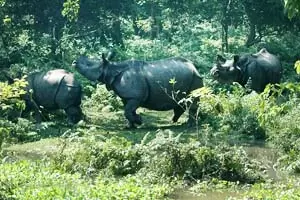Protecting the rare one-horned rhino is no easy job

24-September-2010
Vol 1 | Issue 4
When River Brahmaputra swells, several parts of Assam go under water. But when the waters gush into the Pobitora Wildlife Sanctuary in Morigaon district, which is home to the rare one-horned rhinoceros, the guards there gird their loins and work round-the-clock putting their lives at risk. So when Assam had its third floods of the year in September, many of the guards had to forego their Puja holidays and prevent the animals from straying out of the boundary and thus falling prey to poachers.
One of the ‘guardians of the jungle’, Girin Deka, who has been in service for 20 years, says: “It is this time when we have to be on our toes to monitor animals’ movement and ready to face any critical situation for their safety.” Along with Deka there are 93 other forest guards who are now keeping a close vigil in and out of the sanctuary to guide the animals to highlands from the flooded areas. “We are running short of manpower and lack in logistics. After the heavy rainfall for the last one week, power supply to the sanctuary has been cut and we lost our satellite communication. We have only one motor boat and the country boats are not in good condition to use during a flood. Despite all these odds, we are compelled by our love for these animals to go to the jungle and ensure their safety,” says Sukleshwar Rajbongshi, Deputy Game Warden of the sanctuary.
 |
|
The rare one-horned rhinoceros at Pobitora Wildlife Sanctuary in Morigaon are caught between the floods and poachers
|
The crisis has not only pushed the guards to do overtime but also to cancel their festival leave. “Every morning we set out on boats through the jungles and try to guide the stray animals to safer places. The sanctuary has 11 artificial highlands and during flood, all the animals gather at these places. However, problem lies with the newborn rhinos and cubs, which usually swim towards human habitat where they are vulnerable to poaching. But sometimes it’s very pathetic to find some of them drowning and dying due to food shortage,” says Puspha Bora, a senior guard.
Guarding the sanctuary during night is fraught with more danger as poachers target rhinos with sophisticated modern weapons while the guards are still armed only with obsolete rifles, says Bora.
The increasing water level of Brahmaputra has submerged 95 percent of the area and out of the 11 highlands in Pobitora , only four - Jogdal, Sitolmari, Pipolati and Haduk – are now habitable for the animals. Moreover, of the 22 camps in the sanctuary, only four - Bokoljan, Hahsora, Murkatra and Nekera - are in a safe condition with 12 camps having been washed away by flood waters.
Yet the guards ensure that the animals do not move out of the sanctuary covering an area of over 38.8 square kilometres. For all the hard work they, most of the staff do not draw decent salaries. “Only 35 wardens are regular employees, the others are not. We are not only facing a threat from poachers but also from the administration. Though the Assam forest department has promised to increase our amenities the implementation remains a distant dream”, says Bogai Saikia, game warden.
A major hub of the Indian Rhino Vision 2020 programme, the sanctuary is situated 48 km east of Guwahati and is surrounded by 68 villages. So wardens have also started sensitising the local villagers on conservation. “The villagers are helping us in many ways. It’s their support that has prevented any poaching in the sanctuary in the last three years,” says Ganesh Deka, forest guard.
The sanctuary is home to hundreds of wild buffaloes, wild boars and civet cats, besides 116 rhinos, whose population has been increasing. Well, for this, credit may go to the guards.
















